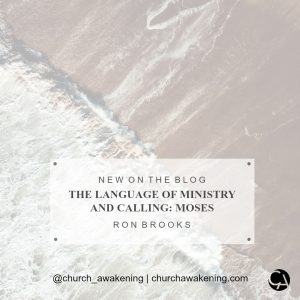The Language of Ministry and Calling: Moses

The well-worn story goes something like this:
Over morning coffee a man looks at his wife and states emphatically: “I don’t care if it’s Sunday morning, I’m not going back to that church. It’s a waste of time. No one likes me at that church. Frankly, I don’t like them either. And….” About that point his wife interrupts with “You have to go to church this morning, dear.” “Why?” he retorts. “Why? Tell me one good reason why I should go back to that church!” “It’s simple, Sweetheart. You’re the pastor.”
While that familiar story is intended to bring a smile to our face, it reveals what too many pastors believe about themselves and the churches they serve.
When you speak of your ministry or calling to ministry to your confidante, what do you say?
Is your language positive and life-giving? Or is it the overflow of a profound woundedness and insecurity?
What do you say to yourself…you know, when you’re driving in the car alone?
What’s your self-talk?
While it may seem like nothing more than innocuous ramblings – venting – of our discouragement, reaction to criticism, and the ubiquitous frustration over blocked goals, the language we use to speak of our ministry and ministry calling has profound implications in our own hearts and minds, as well as in the spirit realm (Matthew 16:19).
Words are important. Solomon said, “Death and life are in the power of the tongue” (Proverbs 18: 21). Jesus explained to the Pharisees that our words, the very language we choose to express ourselves, reflects the content of our heart (Matthew 12:35-37).
I wonder how many times our venting results in an unwitting agreement with the very one intent on destroying every authentic man or woman of God and the work of the Spirit in the Church of Jesus.
Consider Moses, a story most of us know very well as it illustrates how the language we choose to speak of our ministry and ministry calling reflects the content of our heart.
Moses | Exodus 1-4
I think if we had experienced the childhood-early adulthood he had experienced, we too may have had a sense of entitlement; thoughts that there is something very special about me. Rescued from the Nile River, raised by Pharaoh’s daughter, given privilege, access to the very best available, revered and honored. Wow.
But Moses made a crushing error: he seized control of his own destiny, his own calling. Killing an Egyptian, he flees for his life to Midian, euphemistically known as the “back side of the desert.” In the first few days, weeks, months, he must have “beat himself up” repeatedly. “What a stupid thing to do,” I can hear him say to himself. “But maybe, just maybe, I can still somehow exercise my abilities and gifts and be something of value; accomplish something great.”
But, hope-filled years collapsed into hope-crushing years and a new normal emerged. Moses was done. He was a shepherd. He would be a shepherd. Nothing more. The four decades of isolation and vision-sucking monotony left him empty: no pride, no self-confidence, no nothing.
Many of us have preached and taught on Exodus 3 and the supernatural drama of the burning bush. Wow, what a call to ministry! Maybe forty years earlier Moses would have said: “Thank you, Lord. I’m ready. I’ll do a great work for You.” But, the Moses standing in front of the burning bush was not the same Moses as the one raised in Pharaoh’s household. Notice his language: language that reflects the content of his heart: “But Moses said, ‘Pardon your servant, Lord. Please send someone else.’” (Exodus 4:13). He had argued with God; an argument that stirred the anger of God against him. But, there was nothing left. The entitled, privileged, arrogant Moses had been reduced to dust.
“So I went down to the potter’s house, and I saw him working at the wheel. But the pot he was shaping from the clay was marred in his hands; so the potter formed it into another pot, shaping it as seemed best to him.” (Jeremiah 18:3-4)
The Great I AM had discovered in Moses, the vessel He was shaping for His own purpose, a piece of straw or a pebble. So the vessel being formed had to be crushed, the clay kneaded until the unwanted item could be removed. Then, the Divine Potter started over, spinning the wheel, squeezing, shaping, applying destiny-shaping pressure on the man He had chosen.
Now, fast-forward with me through:
- The nine dramatic miracles that released the Israelites from bondage
- The parting of the Red Sea
- Manna
- Quail from heaven
- Defeat of Amalekites and the power of intercession
- The pillar of cloud and fire
We find ourselves at Exodus 33. Notice the language of verse 15: “Then Moses said to Him, ‘If your presence does not go with us, do not send up from here.’” Moses had learned some things about himself, about the Great I AM, and His people.
Essentially, the heart of Exodus 4:13 and 33:15 are the same, yet with a small, but powerful addition: “I can’t do it Lord, but Your power can. I can’t – I won’t – move without You and Your presence.”
Now it’s time for our own reflection… What language do we use to express what we think and how we feel about our ministry and ministry calling?

Comments (0)